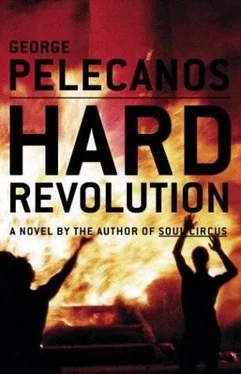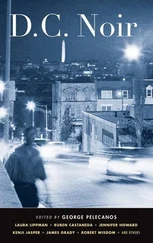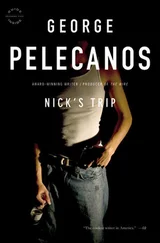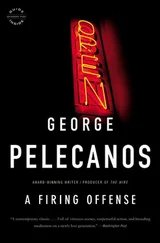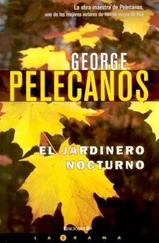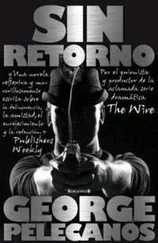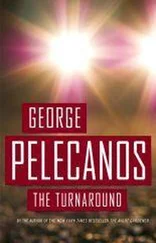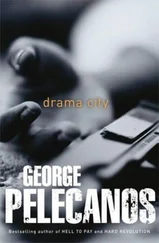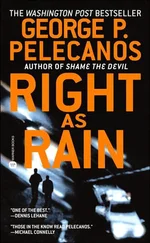
George Pelecanos
Hard Revolution
The fourth Derek Strange and Terry Quinn novel
“You inherit the sins, you inherit the flames.”
– Bruce Springsteen, “Adam Raised a Cain”
DEREK STRANGE GOT down in a three-point stance. He breathed evenly, as his father had instructed him to do, and took in the pleasant smell of April. Magnolias, dogwoods, and cherry trees were in bloom around the city. The scent of their flowers, and the heavy fragrance of a nearby lilac bush growing against a residential fence, filled the air.
“You keep your back straight,” said Derek, “like you’re gonna set a dinner up on it. You ain’t want your butt up in the air, either. That way you’re ready. You just blow right out, like, and hit the holes. Bust on through.”
Derek and his Saturday companion, Billy Georgelakos, were in an alley that ran behind the Three-Star Diner on a single-number block of Kennedy Street, at the eastern edge of Northwest D.C. Both were twelve years old.
“Like your man,” said Billy, sitting on a milk crate, an Our Army at War comic book rolled tightly in his meaty hand.
“Yeah,” said Derek. “Here go Jim Brown right here.”
Derek came up out of his stance and exploded forward, one palm hovering above the other, both close to his chest. He took an imaginary handoff as he ran a few steps, then cut, slowed down, turned, and walked back toward Billy.
Derek had a way of moving. It was confident but not cocky, shoulders squared, with a slight looseness to the hips. He had copied the walk from his older brother, Dennis. Derek was the right height for his age, but like all boys and most men, he wished to be taller. Lately, at night when he was in bed, he thought he could feel himself growing. The mirror over his mother’s dresser told him he was filling out in the upper body, too.
Billy, despite his wide shoulders and unusually broad chest, was not an athlete. He kept up on the local sports teams, but he had other passions. Billy liked pinball machines, cap pistols, and comic books.
“That how Brown got his twelve yards in eleven carries against the ’Skins?” said Billy.
“Uh-uh, Billy, don’t be talkin’ about that.”
“Don Bosseler gained more in that game than Brown did.”
“ In that game. Most of the time, Bosseler ain’t fit to carry my man’s cleats. Two weeks before that, at Griffith? Jim Brown ran for one hundred and fifty-two. The man set the all-time rushing record in that one, Billy. Don Bosseler? Shoot.”
“Awright,” said Billy, a smile forming on his wide face. “Your man can play.”
Derek knew Billy was messing with him, but he couldn’t help getting agitated just the same. Not that Derek wasn’t a Redskins fan. He listened to every game on the radio. He read the Shirley Povich and Bob Addie columns in the Post whenever they saw print. He followed the stats of quarterback Eddie LeBaron, middle linebacker Chuck Drazenovich, halfback Eddie Sutton, and others. He even tracked Bosseler’s yards-per-carry. In fact, he only rooted against the ’Skins twice a year, and then with a pang of guilt, when they played Cleveland.
Derek had a newspaper photo of Brown taped to the wall of the bedroom he shared with his brother. With the exception of his father, there was no one who was more of a hero to him than Brown. This was a strong individual who commanded respect, not just from his own but from people of all colors. The man could play.
“Don Bosseler,” said Derek, chuckling. He put one big, long-fingered hand to the top of his head, shaved nearly to the scalp, and rubbed it. It was something his brother, Dennis, did in conversation when he was cracking on his friends. Derek had picked up the gesture, like his walk, from Dennis.
“I’m kiddin’ you, Derek.” Billy got up off the milk crate and put his comic book down on the diner’s back stoop. “C’mon, let’s go.”
“Where?”
“My neighborhood. Maybe there’s a game up at Fort Stevens.”
“Okay,” said Derek. Billy’s streets were a couple of miles from the diner and several miles from Derek’s home. Most of the kids up there were white. But Derek didn’t object. Truth was, it excited him some to be off his turf.
On most Saturdays, Derek and Billy spent their time out in the city while their fathers worked at the diner. They were boys and were expected to go out and find adventure and even mild forms of trouble. There was violence in certain sections of the District, but it was committed by adults and usually among criminals and mostly at night. Generally, the young went untouched.
Out on the main drag, Derek noticed that the local movie house, the Kennedy, was still running Buchanan Rides Alone, with Randolph Scott. Derek had already seen it with his dad. His father had promised to take him down to U Street for the new John Wayne, Rio Bravo , which had people talking around town. The picture was playing down at the Republic. Like the other District theaters on U, the Lincoln and the Booker T, the Republic was mostly for colored, and Derek felt comfortable there. His father, Darius Strange, loved westerns, and Derek Strange had come to love them, too.
Derek and Billy walked east on the commercial strip. They passed two boys Derek knew from church, and one of them said, “What you hangin’ with that white boy for?” and Derek said, “What business is that of yours?” He made just enough eye contact for the boy to know he was serious, and all of them went on their way.
Billy was Derek’s first and only white playmate. The working relationship between their fathers had caused their hookup. Otherwise they never would have been put together, since most of the time, outside of sporting events and first jobs, colored boys and white boys didn’t mix. Wasn’t anything wrong with mixing, exactly, but it just seemed more natural to be with your own kind. Hanging with Billy sometimes put Derek in a bad position; you’d get challenged out here when your own saw you walking with a white. But Derek figured you had to stand by someone unless he gave you cause not to, and he felt he had to say something when conflict arrived. It wouldn’t have been right to let it pass. Sure, Billy often said the wrong things, and sometimes those things hurt, but it was because he didn’t know any better. He was ignorant, but his ignorance was never deliberate.
They walked northwest through Manor Park, across the green of Fort Slocum, and soon were up on Georgia Avenue, which many thought of as Main Street, D.C. It was the longest road in the District and had always been the primary northern thoroughfare into Washington, going back to when it was called the 7th Street Pike. All types of businesses lined the strip, and folks moved about the sidewalks day and night. The Avenue was always alive.
The road was white concrete and etched with streetcar tracks. Wood platforms, where riders had once waited to board streetcars, were still up in spots, but the D.C. Transit buses were now the main form of public transportation. A few steel troughs, used to water the horses that had pulled the carts of the junkmen and fruit and vegetable vendors, remained on the Avenue, but in short order all of it would be going the way of those mobile merchants. It was said that the street would soon be paved in asphalt and the tracks, platforms, and troughs would disappear.
Billy’s neighborhood, Brightwood, was mostly white, working- and middle-class, and heavily ethnic: Greeks, Italians, Irish Catholics, and all varieties of Jew. The families had moved from Petworth, 7th Street, Columbia Heights, the H Street corridor in Northeast, and Chinatown, working their way north as they began to make more money in the prosperous years following World War II. They were seeking nicer housing, yards for their children, and driveways for their cars. Also, they were moving away from the colored, whose numbers and visibility had rapidly increased citywide in the wake of reurbanization and forced desegregation.
Читать дальше
